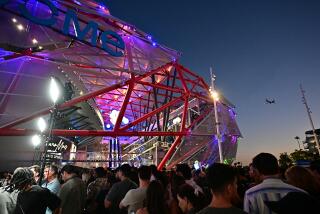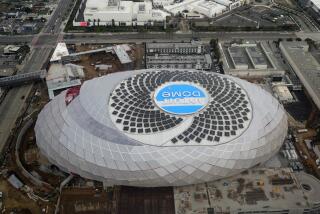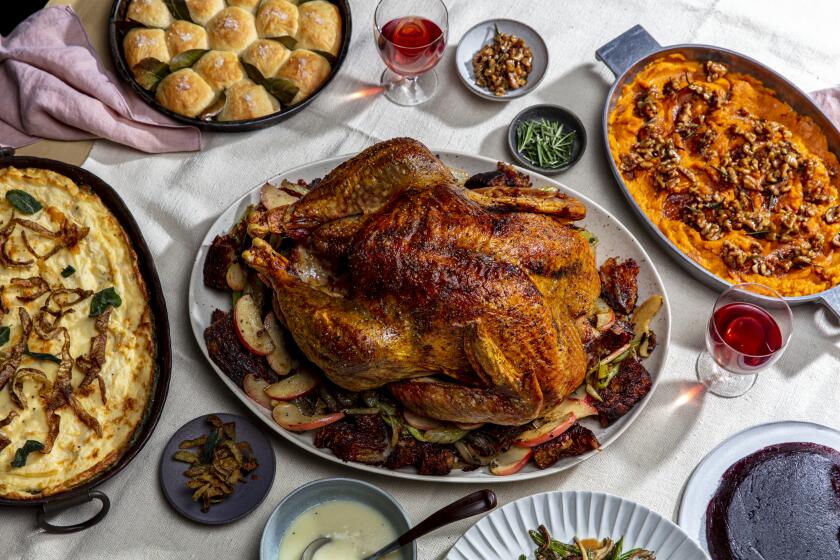Where Drinking and Dining Donât Mix
The folks at San Marinoâs upscale Julienne restaurant are happy to bring you the wineglasses. Itâs the wine thatâs the problem.
Serving alcohol in the cityâs restaurants has been forbidden under a local law for decades, making San Marino the stateâs closest version of a dry town.
That unique status may change soon. Officials are considering allowing beer and wine sales in restaurants as a way to attract a trendy bistro or two to Huntington Drive and jazz up a commercial stretch still rebounding from high vacancy rates a few years back.
But tradition doesnât give way easily in San Marino, an insular and order-minded town where trash cans must be stored out of view and it is illegal to sell goods door-to-door.
âWeâre not going to increase the quality of life by adding more vices in the community,â said Jack Young, an accountant who has lived in San Marino since 1979.
Five years ago, a similar proposal to allow beer and wine sales in restaurants uncorked a tempest of noisy opposition and revealed an evenly divided populace until the City Council dropped the idea.
Proponents contend that a mood change in the broad-lawned city of 13,000 has improved odds for doing away with the ban. Itâs unclear how long the law has been on the books. The best estimates are that it was written in the 1950s or so, devised to keep the racetrack crowd from nearby Santa Anita park from stopping to drink.
Of eight California cities that state officials say sell no alcohol in bars or restaurants, San Marino is the largest--and the only one that expressly forbids it. The other cities are dry because they have no restaurants or bars. (San Marinoâs ordinance does not apply to stores. A pharmacy in town sells liquor, but the alcohol must be consumed elsewhere.)
*
Supporters promise that a new beer and wine policy would include strict conditions, such as requiring that alcohol is served only with meals. Mindful of the cityâs conservative bent, backers vow that bars would remain outlawed.
âWe donât want to break tradition. Weâd like to bend it a bit,â said Councilman Eugene Dryden, who sees the measure as being good for merchants among three commercial pockets along Huntington Drive.
âIt has more to do with the issue of maintaining the business districts of the city--you maintain the climate of the city as a whole,â Dryden said.
Julienne owner Susan Campoy said her Mission Street restaurant is busy enough without selling wine or beer. But she said the law is archaic and keeps other upscale restaurants from moving in.
âTimes have changed,â she said.
Foes from the earlier controversy swear to fight anew. They charge that alcohol sales would threaten safety and mainly benefit âout-of-townâ business interests. Selling alcohol in restaurants would increase the chances for drunk driving through town and make other trouble, opponents say.
âWe want to have the last safe place in Los Angeles County,â said investment manager Dick Spencer. âWeâll go out and [campaign] again if we have to.â
Spencer and other opponents, who gathered hundreds of signatures in blocking the beer and wine proposal in 1992, also derided the newest bid as a way for city officials to find new sources of tax revenue.
The cityâs Planning Commission will revisit the 1992 proposed ordinance at a Nov. 17 meeting. The matter is set to go before the City Council in December. Many in town are bracing for a big to-do.
âThe townâs slow to change,â said Bill Covington, who with his mother owns the Colonial Kitchen on Huntington Drive. He said the owners met surprising resistance when they sought unsuccessfully to repeal the ban after buying the restaurant 12 years ago. âEverybody and their second cousin showed up,â Covington said.
San Marinoâs no-alcohol tradition has spawned its own local customs. Itâs not uncommon for diners to bring their own beer and wine--the restaurants supply the corkscrew and glasses--although alcohol regulators say the practice may technically run afoul of state law. And brown-bagging to any of the cityâs eight restaurants doesnât always sit well with customers.
âItâs kind of a stupid law,â said Ray Balsley, an Alhambra retiree who was sharing a bottle of white zinfandel with his wife and two friends at the Colonial Kitchen one recent afternoon. The group, on their way to a bridge outing, carried the wine in a shopping bag.
One of the foursome, Margaret Adams, shook her head at what she called San Marinoâs sometimes âstuffyâ ways.
âThey want to keep San Marino clean and pure,â Adams said, raising a wine glass to her lips. âI think this is a lot more fun.â
City officials and business leaders complain that the beer and wine ban is hindering efforts to recruit the upscale eateries that they view as potential engines for commerce on Huntington Drive. High-end restaurants will not come if they cannot serve alcohol, officials say. The owners of Chelsea Restaurant, which has 20 seats and does a bustling takeout business on Mission Street, decided against opening a larger sit-down location on Huntington Drive two years ago in part because of the ban, said owner Maggie Cheng.
Taking a page from revitalizing downtown areas in small cities such as Sierra Madre, planners hope that new restaurants will boost mom-and-pop stores bunched in sleepy pockets along 2 1/2 miles of Huntington Drive. The arrival of several new businesses, including a Starbucks Coffee and Blockbuster Video, have helped assuage vacancy worries, but more work is needed, officials said. Some would like to see a bookstore or surf shop, perhaps art and antique stores.
âSomething needs to be done as far as a shot in the arm for our commercial districts,â said David Saldana, the cityâs planning and building director.
Opponents scoff at such arguments. âThe citizens of San Marino are not pushing for more business. Itâs a bedroom community and we want to keep it that way,â Young said. Spencer said the beneficiaries of a change in the law would be business leaders and merchants who live outside San Marino. He did not name them.
âThey should stop trying to change a town that doesnât need to be changed,â Spencer said.
Spencer insists that his group isnât out to turn San Marino into a town of teetotalers. That would be hard to do. Supermarkets selling liquor sit just outside city limits at each end of Huntington Drive. And itâs a short haul to any number of restaurants serving alcohol in surrounding cities.
But the outside forces feared by those wishing to lift the alcohol ban are malls and dining districts that tug San Marinans to spend money elsewhere.
Gift store owner Nancy Billings said retailers are âplodding alongâ on Huntington Drive, where shopkeepers lock up by 6 p.m. Billings, who supports a new beer and wine policy, said commerce could stand to be livened up, but just a bit.
âWe donât want to be a big city,â she said. âWe want to stay a small town.â
More to Read
Eat your way across L.A.
Get our weekly Tasting Notes newsletter for reviews, news and more.
You may occasionally receive promotional content from the Los Angeles Times.










